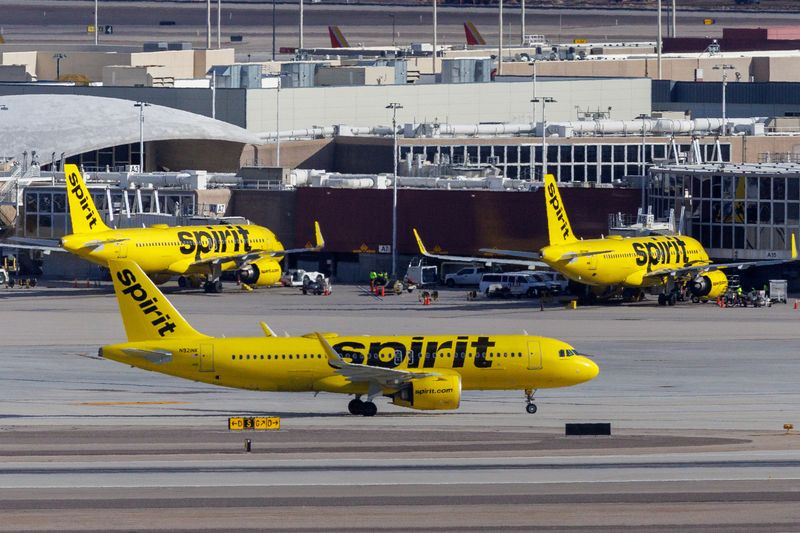By Pratyush Thakur and Rajesh Kumar Singh
(Reuters) -Shares of Spirit Airlines (NYSE:SAVE) plunged 37% to a record low on Friday after a report that the ultra low-cost carrier was discussing a potential bankruptcy filing.
The airline has been losing money despite strong travel demand, raising doubts about its ability to manage looming debt maturities.
Its long-term debt and finance leases amounted to about $3.06 billion, excluding current maturities, as of Dec. 31. The airline has until Oct. 21 to refinance $1.1 billion in loyalty bonds due next year.
The airline was in discussions with bondholders over the terms of a potential bankruptcy filing, the Wall Street Journal reported, adding that a filing, should it happen, would not be imminent.
Reuters could not immediately able to verify the WSJ report, while the airline pointed to CEO Ted Christie's comments during the second-quarter earnings call in August that it was in "productive conversations" with the advisors of its bondholders.
Christie had then declined to take questions on this topic saying the conversations were ongoing. He had in June informed Spirit shareholders that the company was not considering filing for bankruptcy protection.
Some analysts on Thursday expected Spirit to work out a deal with its bondholders. "We suspect Spirit should be able to renegotiate with creditors outside of bankruptcy," Raymond James analyst Savanthi Syth said.
Spirit's shares, which have lost more than 85% of their value this year, were down 25% at $1.67 in afternoon trading, while rival budget carrier Frontier jumped 21%.
Spirit has been facing an uncertain future after the collapse of its $3.8 billion merger deal with JetBlue Airways (NASDAQ:JBLU).
The airline, which has failed to report a profit in the last five out of six quarters, has warned of a bigger third-quarter loss due to a tough race for price-sensitive leisure travelers and an oversupply of airline seats in the domestic market.
Issues with RTX's Pratt & Whitney geared turbofan engines have also forced the airline to ground multiple planes and left it with bloated costs.

To improve its revenue, Spirit has been cutting costs and trying to attract premium travelers.
Raymond James' Syth said its earnings outlook has "somewhat improved" due to aggressive cuts in capacity by airlines in the domestic market, but warned that Spirit still faces a challenge in restructuring its cost.